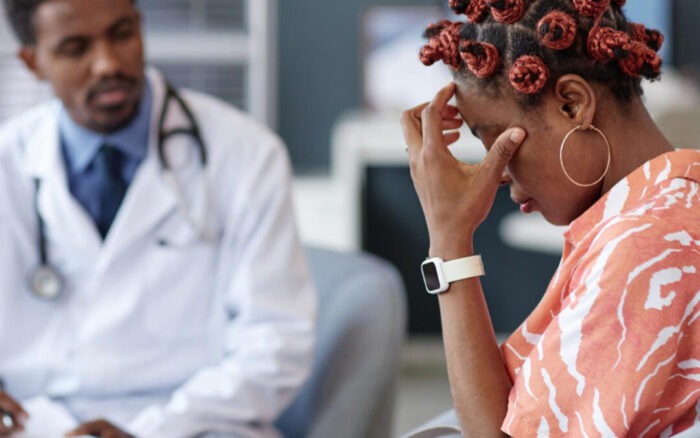Africa
World Mental Health: Breaking The Silence In Africa -By Faith Ali Nuhu
Community support and faith-based organizations can also make a difference. By collaborating with mental health professionals, religious leaders can help reduce stigma within their congregations. Encouraging people to combine faith with therapy—rather than choosing one over the other—can bridge the gap between tradition and modern medicine. Families, too, must learn to recognize signs of mental distress and offer support rather than judgment. Compassion and understanding can make the difference between life and death for someone battling depression or suicidal thoughts.

Each year, World Mental Health Day shines a light on an issue that affects millions globally yet remains deeply misunderstood and stigmatized—mental health. In Africa, where cultural and social beliefs often define perceptions of illness, mental health is still surrounded by silence, fear, and shame. Many people suffering from conditions like depression, anxiety, or post-traumatic stress disorder (PTSD) are often ignored, ridiculed, or labeled as “possessed.” This widespread misunderstanding not only prevents individuals from seeking help but also perpetuates cycles of suffering that affect families, workplaces, and communities.
In many African societies, mental illness is often seen as a moral or spiritual failing rather than a medical condition. Traditional healers and religious figures are frequently consulted before mental health professionals, sometimes leading to harmful practices that worsen the patient’s condition. While spirituality and community support can play positive roles in healing, the absence of professional diagnosis and therapy often delays recovery. This belief system, passed down through generations, has created a stigma so deep that many people suffer in silence for years without seeking help.
According to the World Health Organization (WHO), more than 116 million people in Africa live with mental health conditions, yet less than 10% have access to adequate treatment. The shortage of trained mental health professionals is alarming—some African countries have fewer than one psychiatrist for every million citizens. Hospitals and clinics are poorly equipped, and mental health programs receive minimal funding compared to other health priorities. In many rural areas, there are simply no services available, leaving those in need completely neglected. The result Is an invisible epidemic that cuts across all social classes and age groups.
The COVID-19 pandemic further exposed and worsened Africa’s mental health crisis. Lockdowns, economic hardship, and loss of loved ones triggered a wave of depression and anxiety across the continent. Young people, in particular, have been deeply affected by unemployment and uncertainty about the future. In Nigeria, for instance, mental health hotlines recorded a sharp increase in calls during the pandemic, highlighting a growing need for psychosocial support. Unfortunately, most governments were unprepared to deal with this mental health fallout, revealing the weakness of existing healthcare systems.
Despite these challenges, progress is being made. Across Africa, a new generation of psychologists, social workers, and advocates is leading a movement to normalize conversations about mental health. Social media campaigns, podcasts, and community-based initiatives are helping to break the silence. In Kenya, the “Mindful Africa” project has been offering free counseling services to young adults. In Nigeria, organizations like Mentally Aware Nigeria Initiative (MANI) are using digital tools to connect people to mental health professionals. These grassroots efforts are helping to challenge stigma and change perceptions, one conversation at a time.
Education remains a key weapon in this battle. When people understand that mental illness is not a curse or punishment, they are more likely to seek help and show empathy. Schools and universities can play a major role by integrating mental health education into their curricula. Teaching young people about emotional intelligence, stress management, and mental well-being can foster a culture of openness and care. Similarly, workplaces must begin to recognize the importance of mental health, offering counseling and flexible support for employees facing emotional challenges.
Governments also have a critical role to play. Only a handful of African nations, including South Africa, Ghana, and Kenya, have comprehensive mental health policies in place. Nigeria passed its Mental Health Act in 2023—a major milestone after decades of advocacy—but implementation remains slow. To make real progress, mental health must be treated as a public health priority, with proper funding for facilities, research, and personnel training. Public awareness campaigns, helplines, and community clinics should be expanded, ensuring that help is accessible to everyone, especially in underserved rural areas.
Community support and faith-based organizations can also make a difference. By collaborating with mental health professionals, religious leaders can help reduce stigma within their congregations. Encouraging people to combine faith with therapy—rather than choosing one over the other—can bridge the gap between tradition and modern medicine. Families, too, must learn to recognize signs of mental distress and offer support rather than judgment. Compassion and understanding can make the difference between life and death for someone battling depression or suicidal thoughts.
The theme for World Mental Health Day 2025, “Mental Health is a Universal Human Right,” reminds us that mental well-being is not a privilege—it’s a necessity. Every person deserves access to care, regardless of income or location. Breaking the silence around mental health in Africa is not just about ending stigma—it’s about saving lives, restoring hope, and building resilient communities. If society can begin to see mental health as part of overall health, then healing can truly begin. Africa’s future depends not only on its physical strength but also on the strength of its mind.
Faith Ali Nuhu is a 300 level student from Kashim Ibrahim University (Formerly Borno State University, Maiduguri)






















